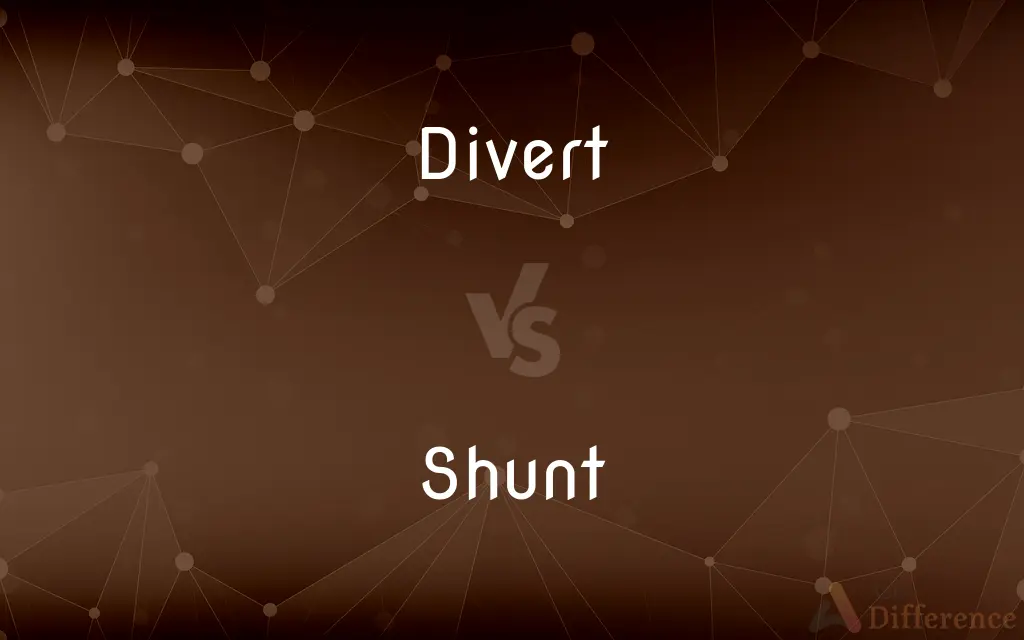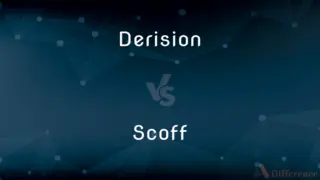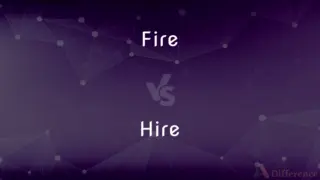Divert vs. Shunt — What's the Difference?

Difference Between Divert and Shunt
ADVERTISEMENT
Compare with Definitions
Divert
Cause (someone or something) to change course or turn from one direction to another
A scheme to divert water from the river to irrigate agricultural land
Shunt
The act or process of turning aside or moving to an alternate course.
Divert
Distract (someone) from something
She managed to divert Rose from the dangerous topic of Lady Usk
Shunt
A railroad switch.
Divert
To turn aside from a course or direction
Traffic was diverted around the scene of the accident.
ADVERTISEMENT
Shunt
(Electricity) A low-resistance connection between two points in an electric circuit that forms an alternative path for a portion of the current. Also called bypass.
Divert
To distract
My attention was diverted by an argument between motorists.
Shunt
(Medicine) A passage between two natural body channels, such as blood vessels, especially one created surgically to divert or permit flow from one pathway or region to another; a bypass.
Divert
To entertain by distracting the attention from worrisome thoughts or cares; amuse.
Shunt
To turn or move aside or onto another course
Shunting traffic around an accident.
Divert
To turn aside.
Shunt
To evade by putting aside or ignoring
Urgent problems that society can no longer shunt aside.
Divert
(transitive) To turn aside from a course.
The workers diverted the stream away from the road.
Shunt
To switch (a train or car) from one track to another.
Divert
(transitive) To distract.
Don't let him divert your attention; keep your eye on the ball.
Shunt
(Electricity) To provide or divert (current) by means of a shunt.
Divert
(transitive) To entertain or amuse (by diverting the attention)
Shunt
(Medicine) To divert or permit flow of (a body fluid) from one pathway or region to another by surgical means.
Divert
To turn aside; to digress.
Shunt
To move or turn aside.
Divert
To turn aside; to turn off from any course or intended application; to deflect; as, to divert a river from its channel; to divert commerce from its usual course.
That crude apple that diverted Eve.
Shunt
(Electricity) To become diverted by means of a shunt. Used of a circuit.
Divert
To turn away from any occupation, business, or study; to cause to have lively and agreeable sensations; to amuse; to entertain; as, children are diverted with sports; men are diverted with works of wit and humor.
We are amused by a tale, diverted by a comedy.
Shunt
(transitive) To cause to move (suddenly), as by pushing or shoving; to give a (sudden) start to.
Divert
To turn aside; to digress.
I diverted to see one of the prince's palaces.
Shunt
(transitive) To divert to a less important place, position, or state.
Divert
Turn aside; turn away from
Shunt
(transitive) To provide with a shunt.
To shunt a galvanometer
Divert
Send on a course or in a direction different from the planned or intended one
Shunt
To move data in memory to a physical disk.
Divert
Occupy in an agreeable, entertaining or pleasant fashion;
The play amused the ladies
Shunt
To divert electric current by providing an alternative path.
Divert
Withdraw (money) and move into a different location, often secretly and with dishonest intentions
Shunt
To move a train from one track to another, or to move carriages, etc. from one train to another.
Shunt
To have a minor collision, especially in a motor car.
Shunt
To divert the flow of a body fluid.
Shunt
To turn aside or away; to divert.
Shunt
To carry on arbitrage between the London stock exchange and provincial stock exchanges.
Shunt
An act of moving (suddenly), as due to a push or shove.
Shunt
(electricity) A connection used as an alternative path between parts of an electrical circuit.
Shunt
(firearms) The shifting of the studs on a projectile from the deep to the shallow sides of the grooves in its discharge from a shunt gun.
Shunt
An abnormal passage between body channels.
Shunt
(surgery) A passage between body channels constructed surgically as a bypass; a tube inserted into the body to create such a passage.
Shunt
(rail transport) A switch on a railway used to move a train from one track to another.
Shunt
A minor collision between vehicles.
Shunt
To shun; to move from.
Shunt
To cause to move suddenly; to give a sudden start to; to shove.
Shunt
To turn off to one side; especially, to turn off, as a grain or a car upon a side track; to switch off; to shift.
For shunting your late partner on to me.
Shunt
To provide with a shunt; as, to shunt a galvanometer.
Shunt
To go aside; to turn off.
Shunt
A turning off to a side or short track, that the principal track may be left free.
Shunt
A conducting circuit joining two points in a conductor, or the terminals of a galvanometer or dynamo, so as to form a parallel or derived circuit through which a portion of the current may pass, for the purpose of regulating the amount passing in the main circuit.
Shunt
The shifting of the studs on a projectile from the deep to the shallow sides of the grooves in its discharge from a shunt gun.
Shunt
A passage by which a bodily fluid (especially blood) is diverted from one channel to another;
An arteriovenus shunt
Shunt
A conductor having low resistance in parallel with another device to divert a fraction of the current
Shunt
Implant consisting of a tube made of plastic or rubber; for draining fluids within the body
Shunt
Transfer to another track, of trains
Shunt
Provide with or divert by means of an electrical shunt
Share Your Discovery

Previous Comparison
Derision vs. Scoff
Next Comparison
Fire vs. Hire














































